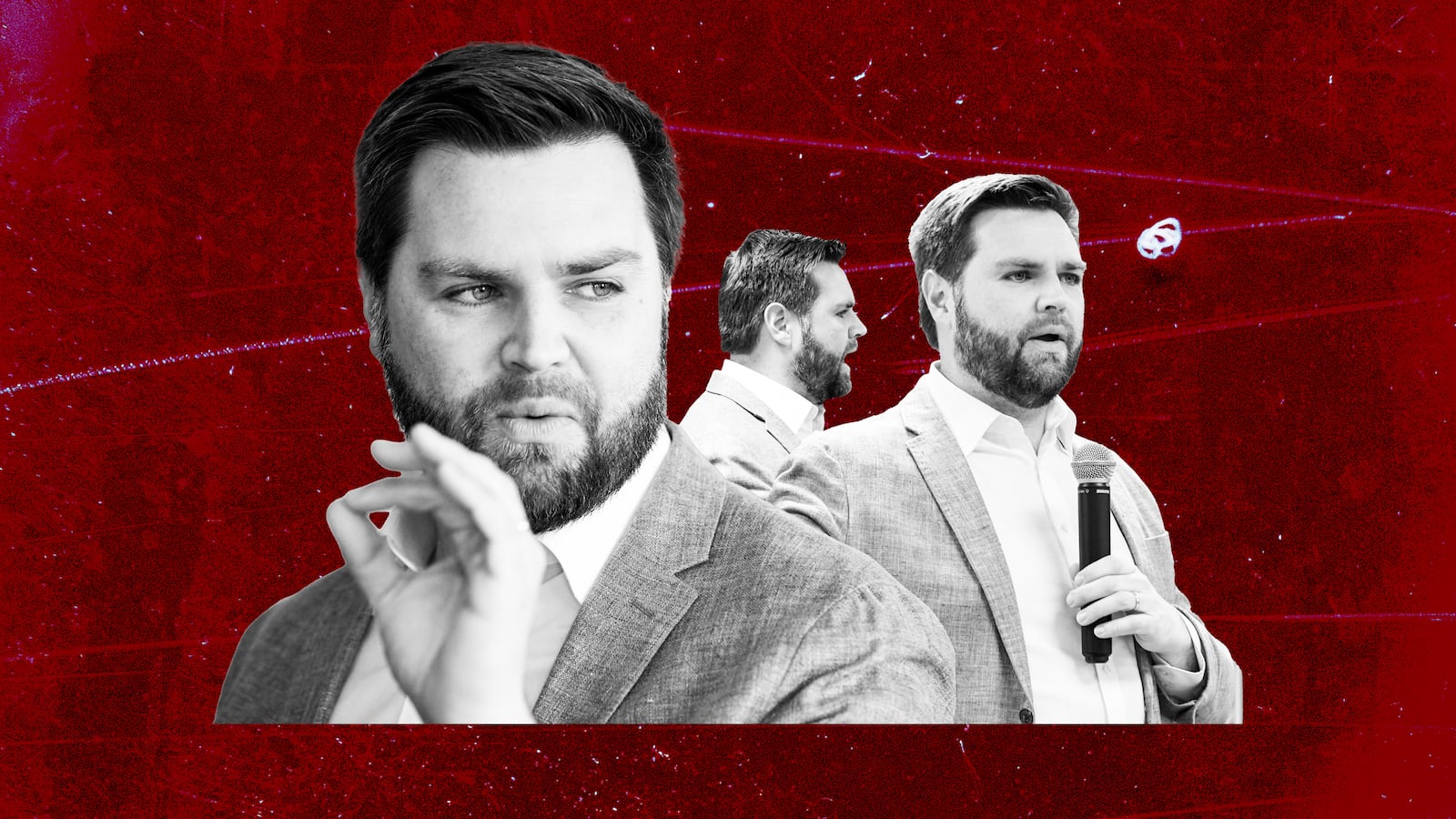On Monday, days after former President Donald Trump endorsed venture capitalist J.D. Vance’s Senate candidacy in Ohio, Vance’s former law school roommate posted an explosive Facebook conversation between the two men ahead of the 2016 election. In the chat, Vance railed against Trump as a “cynical asshole” and “America’s Hitler,” and said the GOP’s true voter base is under-educated and poor—“whether we like it or not.”
The messages quickly went viral.
Josh McLaurin, the roommate and now a Democratic state representative in Georgia, told The Daily Beast that Vance knows exactly what he’s doing.
“It’s almost like his whole reason for being is to own the libs, disrupt the normal media environment, and prove that the opposition is worse somehow [than] the Republican Party—or evil on its own. Which is a kind of a denial,” McLaurin said.
McLaurin painted Vance as ambitious and talented, but also a transactional and deeply numbed cynic who shows little to no shame about the things he will say, do, and forfeit in order to achieve power.
“And as it became clear to me that that’s what he was trying to do, I started to realize that he was the most dangerous candidate. And it took Trump endorsing him and him giving a full-throated acceptance of that endorsement to sort of seal the deal for me and make me choose to highlight the hypocrisy,” McLaurin said.
“And since he’s not interested in healing anymore, he’s just interested in more division and whatever his own ambitions are, you know, I have very little sympathy left,” he added.
Asked for comment, Vance campaign spokesperson Taylor Van Kirk said, “This dude’s 15 minutes are almost up.”
McLaurin roomed with Vance and a third man during their first year at Yale Law in 2010, but he peeled away the following year.
“Everybody knew he had promise, especially once he started forming relationships in law school with some pretty powerful people. And I had the sense, which maybe others did, that he had the potential to remake the GOP somehow,” McLaurin said.
While McLaurin said that he and Vance “weren’t particularly close as roommates,” he noted that when he later crowdfunded a documentary about a Tea Party group in Tennessee, Vance chipped in.
“He actually said to me, in a message, something like, ‘I support this project even more than you know.’ Because what motivated him in his core was giving a voice and a life to these people who other people were so down on,” he said.
McLaurin later abandoned the project, saying the popularity of the Tea Party made him unwilling to give them what he saw as an additional platform. After that, he and other alumni watched Vance from afar, as he took his Yale J.D. to the rarefied world of San Francisco venture capital. There, Vance made powerful friends, like billionaire tech mogul Peter Thiel, who later invested in Vance’s own investment firm and, eventually, his candidacy.
Then Vance published Hillbilly Elegy, establishing himself as a highly sought-after conservative voice amid the fractious 2016 election. McLaurin, curious about Vance’s nuanced never-Trump dissents, reached back out.
On Monday, he tweeted Vance’s response from that 2016 Facebook chat, and it went viral.
In the messages, Vance called Trump a “cynical asshole like Nixon” and “America’s Hitler.” Trump’s rise, he said, was “the fruit of the party’s collective neglect,” and the GOP “has only itself to blame.”
“We are, whether we like it or not, the party of lower-income, lower-education white people, and I have been saying for a long time that we need to offer those people SOMETHING,” Vance wrote, because if they don’t, “a demagogue would.”
The comments were in line with a number of other anti-Trump remarks that over the last year have come back to haunt Vance’s candidacy—though the Hitler comparison took it up a level. But at the time, McLaurin found Vance’s analysis astute, and pitched him on co-writing a joint op-ed. Vance, he said, was into it.
Then Trump won the election, and Vance suddenly was less receptive, McLaurin told The Daily Beast. After McLaurin told Vance he was weighing a run for office as a Democrat and wanted advice from a conservative perspective, Vance stopped responding altogether, McLaurin said.
“I think for me, what it meant was I had a little bit of a store of goodwill for him that could be depleted, but would take some work to deplete,” he said.
Still, he held out hope, even after Vance stepped into the Senate fray.
“I actually got into an argument with some law school classmates early on, when they saw the tack he was taking. I was saying no, you know, it could be that he sees the essential sickness of his party and is trying to position himself to do something about it,” McLaurin said.
“But it got to a point where I just thought, I don’t know that he has any goodwill left for me,” he said. “And not just me, but the way that he’s characterized people like me.”
McLaurin pointed to what he called Vance’s bitterness towards the left, citing “playground insults” such as calling Democrats “a bunch of childless cat ladies.”
Vance, McLaurin said, has today all but abandoned his younger, intellectual obsessions with policy and problem-solving, swapping them out for a platform based largely on culture war bait—or “social irritation,” as McLaurin put it. As a result, he said, Vance has assumed the image of the very person he had not long ago compared to Adolf Hitler.
“It became clear that the purpose of his campaign was Trumpian, designed to defy norms more than it was designed to chart out the substance of the political platform,” he said. “The hypocrisy is that he was somebody who genuinely cared about moving his party’s message back to the people it’s supposed to serve. And maybe through some sort of convoluted ends-justify-means calculation he has decided that adhering so closely to Trump is the shortest route to being able to represent those people. Well, the problem is time and time again, as we’ve seen with people who sell out to Trump, that calculation just doesn’t end up working out.”
After Vance’s stagnant and possibly moribund campaign got a lifeline with Trump’s endorsement, McLaurin said he felt compelled to come forward.
“Look, seeking power is not fun,” he said. “And the corollary to that is that selling out just isn’t worth it. Because the amount of power you end up getting for denying yourself, for denying your own truths—you’re the dog that catches the car and you’re like, what have I really gained?”
“Power ain’t that fun. It’s just not worth it to sell yourself out or sell your own truth out to get it,” he said. “That’s I think maybe the clearest distillation I can make of all this.”








